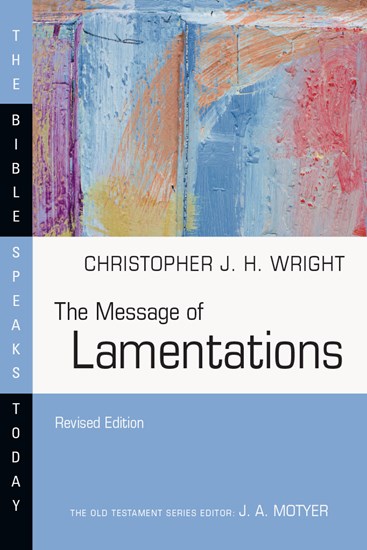
“The Message of Lamentations” by Christopher J. H. Wright offers a profound exploration of the biblical book of Lamentations, delving into its historical context, literary structure, and theological significance. Wright begins by providing an overview of the book’s background, highlighting its lament genre and its placement within the broader biblical narrative. He then proceeds to analyze each chapter of Lamentations, unpacking its themes of suffering, repentance, and hope in the midst of despair. Throughout the book, Wright emphasizes the importance of understanding Lamentations in its historical context while also drawing out its timeless relevance for contemporary readers.
Christopher J. H. Wright, a respected Old Testament scholar and Anglican clergyman, brings a wealth of academic expertise and pastoral insight to his exploration of Lamentations. As the International Ministries Director of Langham Partnership and the author of numerous books on biblical theology, Wright is well-qualified to engage with the complexities of Old Testament texts. His credentials include a Ph.D. in Old Testament studies from the University of Cambridge and extensive experience teaching and preaching in various church contexts. Wright’s approach combines rigorous scholarship with a deep commitment to the authority of Scripture, making his work highly respected within evangelical circles.
In comparison to other books on Lamentations, Wright’s “The Message of Lamentations” stands out for its combination of academic rigor and pastoral sensitivity. While some commentaries may focus primarily on exegetical analysis, Wright’s work goes beyond mere textual interpretation to explore the theological and practical implications of Lamentations for believers today. His emphasis on the book’s themes of lament, repentance, and hope distinguishes his commentary from others and makes it a valuable resource for pastors, scholars, and lay readers alike.
Wright’s exploration of Lamentations offers readers a deep and nuanced understanding of the book’s message and its relevance for Christian life and faith. By examining the various laments found within the book, Wright helps readers to engage with the reality of suffering and to find hope in God’s faithfulness, even in the midst of despair. His analysis of the theological themes of lament, repentance, and restoration provides readers with practical insights into how they can respond faithfully to trials and difficulties in their own lives.
Throughout “The Message of Lamentations,” Wright demonstrates a thorough engagement with the biblical text, drawing upon both historical-critical methods and theological interpretation. He carefully exegetes each passage of Lamentations, paying close attention to its literary structure, linguistic features, and theological themes. Additionally, Wright consistently anchors his interpretation in the broader biblical narrative, demonstrating how Lamentations fits within the overarching story of God’s redemptive work in the world.
For pastors and church leaders, “The Message of Lamentations” serves as a valuable resource for preaching, teaching, and pastoral care. Wright’s insights into the themes of lament, repentance, and hope provide pastors with biblical wisdom and practical guidance for shepherding their congregations through times of trial and suffering. His exegetical analysis and theological reflection offer pastors a solid foundation for crafting sermons and leading Bible studies that address the real-life struggles of their congregants.
Statement of Compliance: “I received ‘The Message of Lamentations’ by IVP for the purpose of an unbiased review. I have not received any compensation for providing a positive review. My opinions are entirely my own and reflect my sincere evaluation of the book.”
Book Details:
- Title: The Message of Lamentations
- Author: Christopher J. H. Wright
- Publisher: IVP






